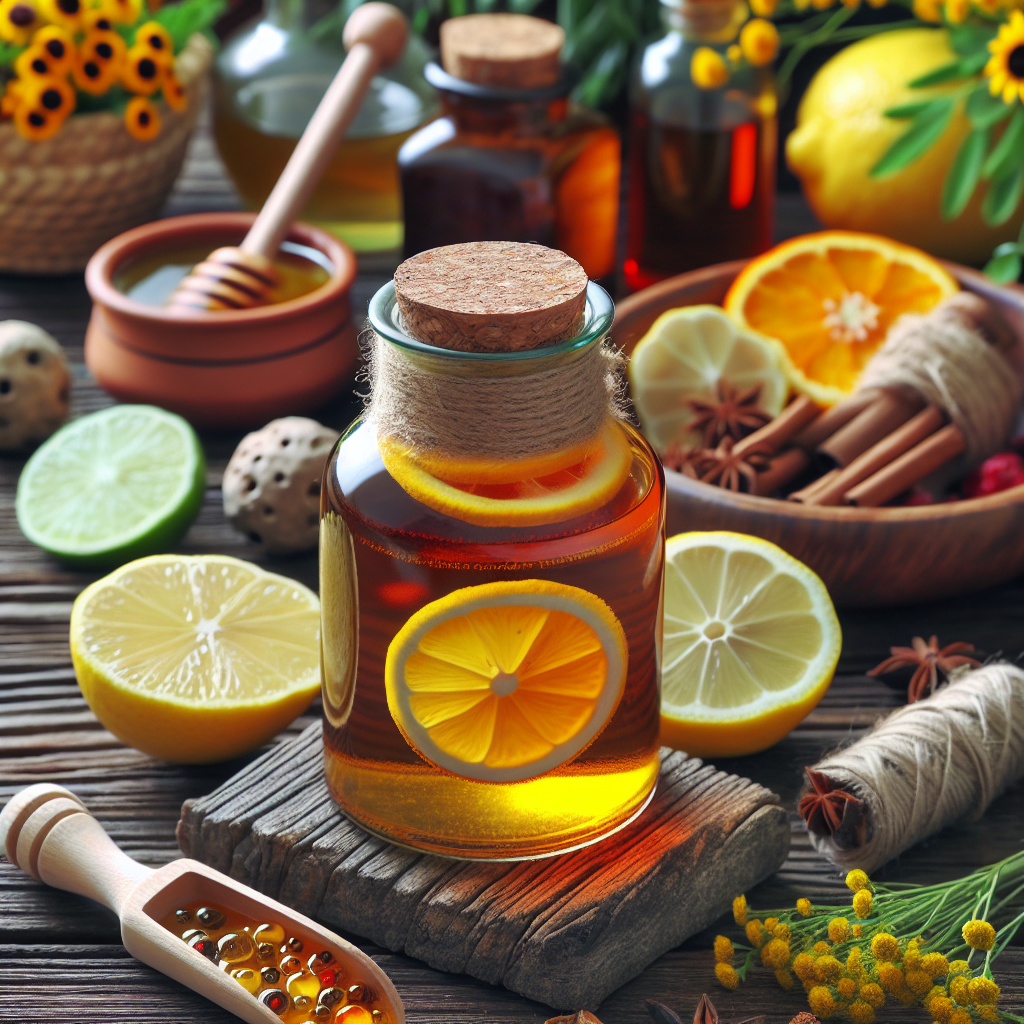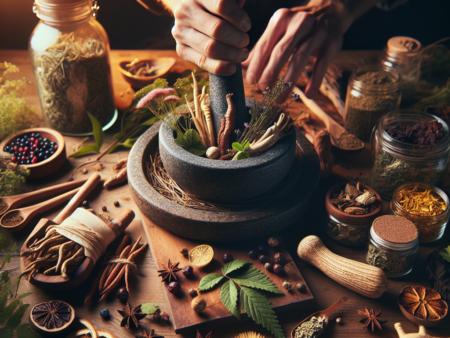Deskripsi meta: Ramuan alami tradisional untuk mengobati demam, warisan racikan yang efektif.
Ramuan Alami untuk Mengobati Demam: Warisan Racikan Tradisional
-
Table of Contents
- Introduction
- The Concept of Ramuan Alami
- The Role of Traditional Healers
- Common Ingredients in Ramuan Alami
- 1. Temulawak (Curcuma xanthorrhiza)
- 2. Jahe (Zingiber officinale)
- 3. Kunyit (Curcuma longa)
- 4. Daun Sirih (Piper betle)
- Preparation and Administration
- Traditional Rituals and Beliefs
- Scientific Evidence and Modern Perspectives
- Curcumin
- Ginger
- Betel Leaves
- Conclusion
Introduction

Demam, or fever, is a common health issue that affects people of all ages. It is characterized by an increase in body temperature, often accompanied by other symptoms such as headache, body aches, and fatigue. In Indonesia, traditional medicine has long been used to treat various ailments, including demam. Ramuan alami, or natural remedies, have been passed down through generations as a heritage of traditional concoctions. These remedies are believed to be effective in alleviating symptoms and promoting recovery. In this article, we will explore the traditional Indonesian remedies for treating demam and their potential benefits.
The Concept of Ramuan Alami
Ramuan alami refers to natural remedies that are made from various plant-based ingredients. These remedies have been used for centuries in Indonesian traditional medicine, known as Jamu. The concept of ramuan alami revolves around the belief that nature provides us with healing properties that can be harnessed to treat illnesses. These remedies are often prepared by combining different herbs, spices, and other natural ingredients to create a potent concoction.
The Role of Traditional Healers
Traditional healers, known as dukun or tukang jamu, play a significant role in the practice of ramuan alami. They possess extensive knowledge of medicinal plants and their healing properties. These healers have inherited their expertise from their ancestors and have honed their skills through years of experience. They are highly respected members of the community and are sought after for their ability to diagnose and treat various ailments, including demam.
Common Ingredients in Ramuan Alami
Ramuan alami for treating demam often include a combination of herbs, spices, and other natural ingredients. Here are some commonly used ingredients and their potential benefits:
1. Temulawak (Curcuma xanthorrhiza)
Temulawak, also known as Javanese ginger, is a rhizome that is widely used in Indonesian traditional medicine. It contains curcumin, a compound known for its anti-inflammatory and antioxidant properties. Temulawak is believed to help reduce fever, relieve pain, and boost the immune system.
2. Jahe (Zingiber officinale)
Jahe, or ginger, is a popular ingredient in ramuan alami for demam. It has been used for centuries for its warming properties and ability to promote sweating, which can help reduce fever. Ginger also has anti-inflammatory and analgesic effects, making it beneficial for relieving symptoms associated with demam.
3. Kunyit (Curcuma longa)
Kunyit, or turmeric, is another commonly used ingredient in ramuan alami. It contains curcumin, which has been found to have anti-inflammatory, antioxidant, and immunomodulatory effects. Kunyit is believed to help reduce fever, alleviate pain, and support the immune system.
4. Daun Sirih (Piper betle)
Daun sirih, or betel leaves, have been used in traditional medicine for their antimicrobial and anti-inflammatory properties. They are often used in ramuan alami for demam to help reduce fever and relieve symptoms such as headache and body aches.
Preparation and Administration
Ramuan alami for demam are typically prepared by boiling the ingredients in water to extract their beneficial compounds. The resulting concoction is then strained and consumed as a tea or tonic. Some remedies may also involve the use of external applications, such as compresses or ointments, to provide relief from symptoms.
Traditional Rituals and Beliefs
In addition to the preparation and administration of ramuan alami, traditional rituals and beliefs are often associated with their use. These rituals may involve prayers, incantations, or specific instructions on when and how to consume the remedy. These practices are deeply rooted in Indonesian culture and are believed to enhance the effectiveness of the remedy.
Scientific Evidence and Modern Perspectives
While ramuan alami has been used for generations and is deeply ingrained in Indonesian culture, scientific evidence supporting their effectiveness is limited. However, some studies have explored the potential benefits of individual ingredients commonly used in ramuan alami.
Curcumin
Curcumin, found in temulawak and kunyit, has been extensively studied for its medicinal properties. Research suggests that curcumin has anti-inflammatory, antioxidant, and immunomodulatory effects, which may contribute to its potential benefits in reducing fever and supporting the immune system.
Ginger
Ginger, known for its warming properties, has been studied for its potential antipyretic effects. Some research suggests that ginger may help reduce fever by promoting sweating and increasing heat loss from the body.
Betel Leaves
Studies have shown that betel leaves possess antimicrobial and anti-inflammatory properties. These properties may contribute to their potential benefits in reducing fever and relieving symptoms associated with demam.
Conclusion
Ramuan alami, the traditional Indonesian remedies for treating demam, have been passed down through generations as a heritage of traditional concoctions. While scientific evidence supporting their effectiveness is limited, these remedies continue to be widely used and valued in Indonesian culture. The use of natural ingredients such as temulawak, jahe, kunyit, and daun sirih in ramuan alami reflects the belief in the healing properties of nature. Traditional healers play a significant role in the practice of ramuan alami, providing their expertise and knowledge to diagnose and treat demam. While modern medicine has made significant advancements, the traditional remedies of ramuan alami remain an integral part of Indonesian healthcare, preserving the rich heritage of traditional medicine.







